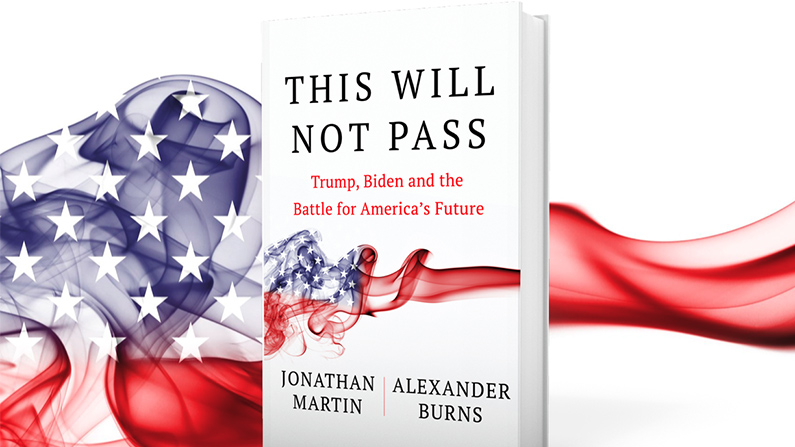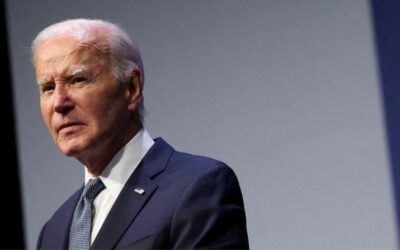Jonathan Martin, a national political correspondent for The New York Times, made a stop in Jackson on Friday, July 1, as part of a tour promoting his new book, “This Will Not Pass: Trump, Biden and the Battle for America’s Future.” The event was organized by the Teton County Library, Equality State Policy Center and local volunteers.
KHOL News Director Kyle Mackie spoke to Martin about the book by Zoom ahead of his visit to Jackson Hole—and about the importance of a certain Wyoming election this year. The following interview transcript has been edited for clarity and brevity.
KYLE MACKIE/KHOL: Jonathan, thank you so much for joining us today on KHOL.
JONATHAN MARTIN: Thanks for having me. Looking forward to being in Jackson.
KHOL: Well, we’re looking forward to it, too. Let’s start with just a summary of your new book. It’s called, “This Will Not Pass: Trump, Biden and the Battle for America’s Future.” And this was co-written with your New York Times colleague Alex Burns. For those of us who haven’t gotten our hands on a copy yet, can you give us the elevator pitch?
MARTIN: Yeah. So, Alex and I have written what is, we think, a really important contribution to this extraordinary moment in American history. It’s an inside account of the last two years of political crisis in America through the prism of leaders in both parties, Democrats and Republicans [in] 2020 and ‘21, both the [presidential] campaign but also the full aftermath of the campaign and President Biden’s first year in office. And this is a panoramic account that includes both presidents Trump and Biden. [It includes] a lot of material on congress and yes, material from outside of Washington, from governors and mayors. So, it’s an account of this stress test in American democracy that we’ve all been living through the last two years and that we’re still dealing with today.
KHOL: So, you’re coming to Wyoming as part of your book tour, and you’ve also been writing quite a bit about our lone congressional representative, Liz Cheney, who in many ways has become the face of Republican opposition to former President Trump and the select committee investigating the Jan. 6 insurrection. So, I wonder what you make about this starring role that Rep. Cheney is playing in American democracy right now?
MARTIN: Yeah, it’s one of the great stories of our time: The daughter of a storied conservative figure, Dick Cheney, former [vice] president, secretary of defense and congressman, who seemed to be following in the footsteps of her dad, climbing the ladder in GOP politics. And then [she] obviously has been radicalized by the former president and the former president’s attempt to overturn the election. And she is now determined, as she has put it herself, to make sure that Trump never comes within spitting distance of the Oval Office again. She is a woman on a mission now, and frankly, to the detriment of her own ambitions and her own career, potentially. But she is obviously convinced that Mr. Trump is a threat to American democracy and is determined to stop him from reclaiming the presidency.
KHOL: Yeah, you mentioned there ‘perhaps at the expense of her career.’ Of course, she’s facing a primary challenge from a Trump-endorsed candidate, and President Trump was just in Wyoming for a rally over Memorial Day weekend. I wonder if you have any predictions about that race or what you’ll be watching?
MARTIN: This is one of most consequential primaries of the year. [The question] is: Can you survive as a Republican and a full-throated Trump critic in 2022 in a really conservative state—a very pro-Trump state, as Wyoming is. And it’s going to tell us a lot about the Republican Party. And frankly, the Republicans who have survived primaries against Trump largely did what Liz Cheney refuses to do, which is bite their tongue and not criticize him, but instead just kind of move on or try to patch up their relationship. Those kind of Republicans have succeeded in primaries, but those who have confronted him forcefully have either decided not to run again or lost their primary. So, this is a really important test of can you speak out bluntly and forcefully against Trump and still succeed in a Republican primary in a Trump state?
KHOL: Well, we are definitely watching that race closely here at KHOL. And of course, as you mentioned in the beginning, it’s not just the Republican Party that’s facing really deep internal divisions right now. You write about struggles in the Democratic Party, and I don’t want to ask you to give away all of the conclusions you arrived at in the book, but I do wonder where you feel like this fraught political moment is leading us as a country.
MARTIN: So, I think the two parties are now largely organized around antipathy toward the other, and that does not lead to a healthy democracy, when the sort of two major political parties in America don’t have a sort of coherent, assertive, proactive agenda and are largely united in their disdain—bordering on fear—of the opposition. But that’s where we are in today’s very tribal times, and that’s what we capture in this book at great length. The two parties are pulling further apart. There’s less of a space in the political center, and that has created enormous challenges for Joe Biden, who’s a Democrat who has never really wanted to put his foot in either camp in his party. He doesn’t want to sort of come out in the moderate camp or the more progressive camp, and I think, because of that he’s obviously had challenges in trying to get through his agenda in the last year and a half. And that combined, obviously, with the Afghanistan pullout and the devastating rise in inflation, obviously put him in a perilous political situation going into the midterm elections.
KHOL: Yeah, I actually listened to Alex’s episode of “The Daily” last week, and it was really fascinating.
MARTIN: And we captured this in the book that, you know, both parties are reluctant to say in public what they will say in private. For Republicans, that’s obviously about their true feelings regarding Donald Trump, right? The Republican leadership class has no use for Donald Trump. They’d be just fine if he fell in a sinkhole tomorrow. For Democrats, it’s a little more complicated. But the truth is, a lot of Democratic leaders believe that the left has hurt the party and that they are restrained from speaking out on certain issues because they don’t want to offend various constituencies in the Democratic Party. In our book, we have a series of memos from Biden’s chief pollster, Johnny Anzalone, in which he warns the White House starting early in 2021 about crime, about immigration and, yes, about inflation, arguing that Biden has to address those issues because they’re going to be salient going forward. But because Democrats are uneasy about addressing some of those topics, because they are delicate within their coalition, you know, Biden did not forcefully address those issues in a way that I think a lot of people in his party quietly would have preferred he did.
KHOL: Amazing. Okay, well, while I have you here, the last question I wanted to ask you: I, like many Americans, I think, have extended family members who identify all across the political spectrum. And when we get together, I try and remind folks that I think we have a lot more in common than maybe cable news would lead us to believe. And I just wonder, after all of your years of covering national politics, what your personal philosophy is for navigating relationships that have maybe been divided by partisan politics?
MARTIN: Now, it’s a great question. You know, historically, at least in my childhood, in my early adult years, in the ‘70s, ‘80s and ‘90s, you know, politics was something that a handful of people were intensely engaged in but the broader population would only tune in for elections, maybe for the State of the Union speech, but otherwise, you know, went about their lives. And it was kind of like your preference—you like vanilla ice cream or chocolate? Do you cheer for the for the Red Sox or the Yankees? And it wasn’t much more than that. Now, it’s become a matter of tribal identity and, you know, which side are you on? And that creates enormous tensions within communities and within families.
And we captured this in the book—the difficulty, especially on the right, of people who did and did not embrace Trump and the problems that that’s created in families, in churches all over the country. And the politics has not been this divisive in modern times. This is really a throwback to an earlier era in American history where, you know, everything about politics was identity based and was very much tribal. And, you know, that’s worrisome because that leads to political violence. And I think the big takeaway from our book, the big warning sign, is that Jan. 6 was not the culmination of events after the election. Jan. 6, I think, sadly and forebodingly, was just one more grim milestone on the way south in our country’s polarized tribal politics.
KHOL: Do you offer any ways that we can perhaps correct course in the book?
MARTIN: You’ve got to buy the book to find that out!
KHOL: Oh, okay [laughing].
MARTIN: No, I’m kidding. Look, I think it’s incumbent on Americans to participate in democracy and decisions about who represents them and also to be good news consumers. Yes, we hope you buy this book, but also, you know, read widely, read deeply. Don’t just seek out a Facebook post that affirms your views or a cable station that affirms your views. Read deeply from all kinds of sources and put reporting ahead of opinion. Find outlets that do old fashioned shoe leather reporting and then form your own views.





